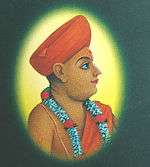Brahmanand Swami
Brahmananad Swami (12 February 1772 - 1832) was revered as a saint of the Swaminarayan Sampraday and as one of Swaminarayan's Paramahamsa. In the scriptures of the Swaminarayan Sampraday it was noted that Brahmanand Swami as stated by Swaminarayan that as the name suggests and implies "Brahmanand" is an Avatar of Brahma. [1][2]

Biography
Brahmanand Swami (Ladudan) was born to Gadhavi Shambhudanji Barot Aashiya and Laluba Charan in Khan village, at the foot of Mount Abu, in sirohi district of Rajasthan in 1772.
At a young age in the royal court he sang poems in Gujarati. The Rana of sirohi, impressed with him, directed that he be taught Pingal (the science of constructing poetry) at the cost of the state. Hence Ladudan was well educated and later became a part of King of Udaipurs court. Ladudan learnt pingal and Sanskrit scriptures from Ladhaji Rajput of Dhamadka, becoming a scholar in Pingal, poetry and scriptures. Ladudan earned fame and wealth by visiting stately courts of Jaipur, Jodhpthers, which were impressed by his poetry.[3]
Initiation as Sadhu
Ladudan was in Bhuj where he had heard about Swaminarayan and went to meet him. Swaminarayan was addressing a gathering in Bhuj. Ladunan was attracted to him. Swaminarayan returned to Gadhada with the poet Ladudan. Ladudan lived a majestic and royal life as befitting a courtier. He was always clad in the most precious attire, adorned with jewellery fit for royalty. Swaminarayan did not like such a luxurious life style but instead of preaching directly he gradually persuaded Ladudan who became an ascetic. On the way from Gadhpur to Siddhapur, at a small village named Gerita, Swaminarayan stopped and administered Bhagwati Deeksha (initiation as sadhu) to Ladudan by giving sainthood name 'Shrirangdasji.' After some time, he renamed him as Brahmanand Swami.[3]
Works
Like Muktanand Swami, Brahmanand Swami was an excellent poet. His skills and brilliance in temple building is evident in temples like Muli, Vadtal and Junagadh. Besides the construction of great temples in Muli, Vadtal, Junagadh etc., Brahmanand Swami had written scriptures in Hindi and Gujarati. 'Brahmanand Kavya' is the collection of his works, a copy of which is preserved in the British Museum in London.[1][4]
Notes
- Williams 2001, pp. 189
- Behramji Merwanji Malabari; Krishnalal M. Jhaveri; Malabari M. B. (1997), Gujarʹat and the Gujarʹatis, Asian Educational Services, p. 263 - 269, ISBN 81-206-0651-5, retrieved 21 May 2009
- Brahmanand Swami, archived from the original on 7 October 2007
- James Fuller Blumhardt (1915), Catalogue of Marathi and Gujarati printed books in the library of the British museum, B. Quaritch, retrieved 21 May 2009 Page 112
References
- Williams, Raymond (2001), Introduction to Swaminarayan Hinduism, Cambridge University Press, ISBN 978-0-521-65422-7
- Brahmanand Swami

